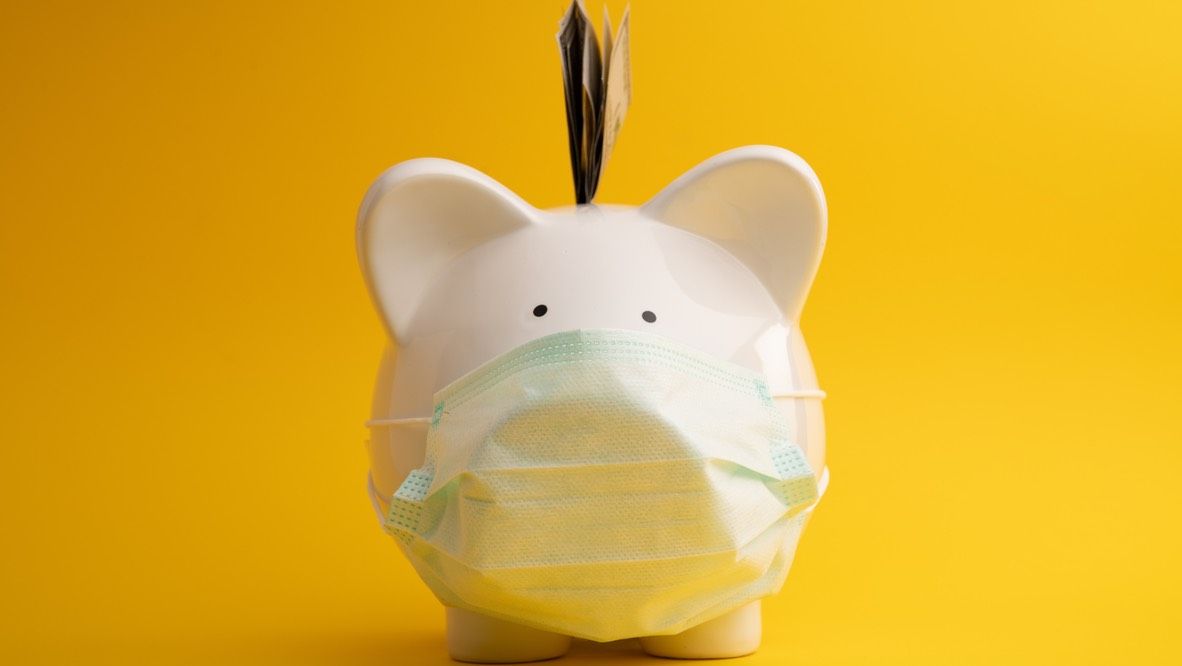
Coronavirus in the United States: How it May Affect Your Money
The coronavirus pandemic is having wide-reaching effects on daily life. Activities that we used to do without a second thought, like going to the office for work or visiting friends, are now things that you need to prepare for or try to stop doing entirely.
The economic impacts of the coronavirus are equally immense to the social impacts. Local businesses are seeing less foot traffic, and some states are ordering restaurants to close their doors or shift entirely to delivery and takeout meals.
Understanding how coronavirus is affecting your money is essential to weathering the storm and coming out of it in a good financial position.
Day to Day Money
On a day to day basis, you could see some small effects of the coronavirus or major impacts, depending on your job.
For many people who can work from home, coronavirus means closed offices and almost fully remote work. This also means that you can cut costs like commute expenses buying lunch at work. This is great for people looking to reduce expenses, but working from home might add other costs to your life. If your office provides complimentary food or coffee, you’ll have to pick up the tab. If your internet isn’t fast enough to handle working from home, you might have to spring for a speedier package.
If you can’t work from home and especially if you participate in the gig economy, coronavirus could mean a sudden drop in your income. People who have to keep going into work will likely see fewer customers. That means fewer tips and the potential for employers to cut hours to reduce costs. It also means the risk of getting sick. If you’re forced to quarantine for two weeks and don’t have access to paid sick time, you’ll also see a major drop in your income.
This potential for lost income makes managing your finances essential. While social distancing will help you cut out expenses like going to the movies or eating at restaurants, try to cut out other unnecessary expenses where you can. If you haven’t built a budget before, take this opportunity to design one.
If you have an emergency fund, you’re in a better place than many Americans. People without emergency savings might want to look into options such as personal loans or assistance that their bank can offer to people experiencing hardship due to coronavirus.
Banking
Banks are not free from the effects of coronavirus. The Federal Reserve cut its benchmark interest rate twice of a target of 0% – 0.25%. Most interest rates are influenced by the Federal Funds Rate, which means banks are lowering interest rates on products like savings accounts and certificates of deposit.
On the other hand, rate cuts also mean lower interest rates for mortgages and auto loans. Consumers with balances left on their mortgage might be able to reduce their monthly payments by refinancing at a lower rate.
Banks are also encouraging consumers to avoid visiting branches and to instead use internet or mobile banking options. Some are even offering assistance to borrowers. For example, Apple recently announced that its Apple Cardholders may request deferment of their March payment, letting them push back the due date until April.
The Job Market
Though the Labor Department hasn’t released numbers for the month of March, most experts expect the coronavirus to have a significant effect on the job market and hiring. With many businesses closing their doors and transitioning to remote work, it becomes difficult to interview candidates and fill positions.
Effects on the supply chain for most businesses, reducing access to or raising the cost of everything from raw materials to computer parts, will also impact the job market. Manufacturers could experience a slowdown, but it might not reflect in hiring numbers for months as the shortages make their way down the supply chain.
Taxes
Tax Day is near and coronavirus is adding to the already complicated process of filing your return and paying your taxes. People who work with a tax professional will likely have to forego face-to-face meetings for electronic communication about their finances. Some states have already announced extensions to the typical tax deadline to help people affected by the pandemic. The IRS is considering doing the same for the federal tax deadline.
President Trump also announced a plan to cut taxes further in response to the pandemic, aiming to provide financial relief to Americans.
Investments
Anyone watching the stock market has seen the impacts that coronavirus is having on investments. The major U.S. indices have seen high levels of volatility, rising or falling by more than 5% per day. Some of the worst days in the history of the stock market are happening now, with the S&P 500 falling from an all-time high 3,386.15 to below 2,400 in less than one month.
The Federal Reserve’s interest rate cuts are partly in response to the weak performance of stocks, but it has done little to curtail the drops.
Oil prices are down, which is also having major effects on the market. A dispute between Saudi Arabia and Russia is causing a flood of supply on the market. This is reducing gas prices for consumers but weakening major oil companies such as Shell and ExxonMobil.
Dropping interest rates also means that bond investors could struggle to find investments with good yield. Existing bonds will gain value, but new bonds will pay incredibly low rates until the Federal Reserve takes action to increase rates.
Real Estate
One of the coronavirus’s most significant impacts on the real estate market is the Federal Reserve’s interest rate cut in response to the economic recession we’re experiencing. The rate cuts are causing mortgage rates to drop, making it a great time for homeowners to refinance their loans and reduce their rates.
The virus is also restricting supply chains used by home builders, making it difficult for new construction to continue. The effects of material shortages could lead to a longer-term reduction in housing supply as builders take time to ramp up production once the pandemic is under control.
Traditionally, limited supply and low interest rates are good for sellers in the real estate market, but this pandemic is impacting every sector of the economy. Demand may fall to the point that sellers will struggle to find a buyer for their home.
Small Businesses
Many small business owners remain optimistic about their futures. Only 27% of small business owners expect the coronavirus to have a significant effect on their revenues. Still, they’re preparing for the virus’s effects, with over half of business owners taking measures such as increasing pricing, changing suppliers, or cutting costs.
Many small businesses are changing the way they operate in response to the pandemic. Many have transitioned to virtual work, and in some states, like Massachusetts, restaurants have moved to offering only takeout and delivery service.
The Small Business Administration announced measures to help small businesses impacted by the pandemic. Small business owners can receive loans and other assistance to remain operational through the crisis. Some states have added additional assistance, such as tax relief or additional access to capital.
Travel
With social distancing serving as one of the most effective ways to curtail the spread of coronavirus, most countries are heavily restricting travel across borders.
As the first country affected by the disease, China was one of the first countries to announce travel restrictions, locking down the city of Wuhan. President Trump recently announced restrictions on travel to the United States from Europe, and Italy has locked down much of the country in attempts to control the outbreak.
Both tourism and business travel have seen massive reductions, and many popular destinations look more like ghost towns than popular vacation spots.
What You Can Do
Here are some of the things that you can do in response to the coronavirus pandemic.
Work to prevent the spread of coronavirus
The CDC estimates that somewhere between 160 and 214 million Americans will get coronavirus over the course of the epidemic. One of the most important things that you can do right now is work to slow the spread of the virus. Even slowing the spread, rather than eliminating it entirely, can help ease the pressure on the American healthcare system, letting more people get the care that they need.
Take control of your finances
If you’re fortunate enough to work in a secure job that you can perform from home, you’ll probably do alright financially during the epidemic. If you work in a more vulnerable industry or rely on contract work, you could see a major reduction in your income.
In either case, this is a good time to take control of your money. Build a budget if you haven’t yet. Try to put together an emergency fund. Take the time to see where your money is going and decide if there’s a better way that you can use your limited financial resources. You’ll leave yourself better off even after the pandemic ends. Also, stay in tune with your investments. Now, more than ever, you should closely track your investment portfolio to be ready for every scenario.
Support local businesses where you can
Even if you’re practicing social distancing and trying to reduce contact with other people, you can still support local businesses and enjoy a restaurant meal here or there. If you have a favorite local store, ask about purchasing a gift card that you can use once the pandemic ends. Order takeout or no-contact delivery from a neighborhood restaurant.
Local businesses will appreciate the revenue, and it gives you a good way to reduce the tedium that staying isolated for long periods can bring.
Check-in on family and friends
Staying social and making sure that your family and friends are healthy is essential during the pandemic. Set up regular video chats or phone calls to check in on your loved ones. If you have kids, you can organize playdates over Skype or Facetime. If you’re a gamer, set up a time to play online games with friends.
Maintaining these social connections in a responsible way can help ease the burden of social distancing.
Summary
Coronavirus is having major impacts across the world. Knowing what those impacts are, how we’ll feel those effects going forward, and steps you can take today to lessen the blow can help you get through an admittedly frightening and difficult situation.


Article comments